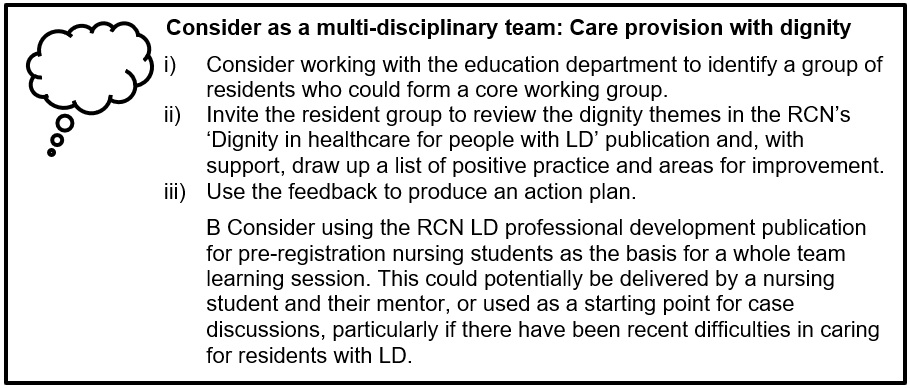Resources for Secure Environments
Learning and Intellectual Disabilities in Secure Environments
Communication and care
National Institute for Health and Care Excellence (2015, updated 2019) Learning disability: behaviour that challenges. Quality standard QS101
There are 12 quality statements in this quality standard. Behaviour that challenges is defined as: Behaviour of such an intensity, frequency or duration as to threaten quality of life and/or physical safety of the person, or others around them (including behaviour likely to severely limit, or result in being denied access to/use of ordinary community facilities).
Requirements of healthcare providers include: identifying lead practitioner to coordinate care; involving families and carers in developing care/support plan; annual health check with GP to identify physical illness early; initial assessment of behaviour to identify triggers, function and environmental causes of behaviour; opportunities for meaningful personalised daily activities (daily activity schedule, behaviour support plan); access to specialist behavioural support (e.g social care providers, community LD teams links on release); support (planned for release) with choice of housing; documented review of person each time restrictive intervention; ensuring psychosocial interventions 1st line (before use of antipsychotics); ensuring medication review (multi-disciplinary) 12/52 after starting antipsychotics and every 6/12.
Royal College of Nursing (2017) Dignity in health care for people with learning disabilities (3rd Edition)
Developed by the RCN LD Nursing Forum with the input of an expert panel of people with learning disabilities, this guidance is designed to improve dignity in healthcare provision for people with LD. The definition of dignity is broken down into key themes identified by the expert panel: understanding my health; respect me; get to know me; having choices and making decisions; feeling safe; communicating with me. The publication gives examples of good practice and also lists medical problems affecting people with LD more commonly than the general population. There is a list of resources and references and an appendix with a Bill of Rights.
Royal College of Nursing (2017) The needs of people with learning disabilities: what pre-registration students should know, London: RCN
This publication was written to identify competencies required by pre-registration nursing students regarding the health needs of people with a LD.
Nursing in Practice (2017). Norman A. Providing support to people with learning disabilities in primary care
This brief article explains issues affecting people with LD, reasonable adjustments that can be made for their appointments (length, timing, communication, Easy Read written information), common health issues and the importance of patient autonomy.
Public Health England Guidance relating to Learning Disabilities
Public Health England has published a collection of guides on reasonable adjustments for people with a learning disability.
